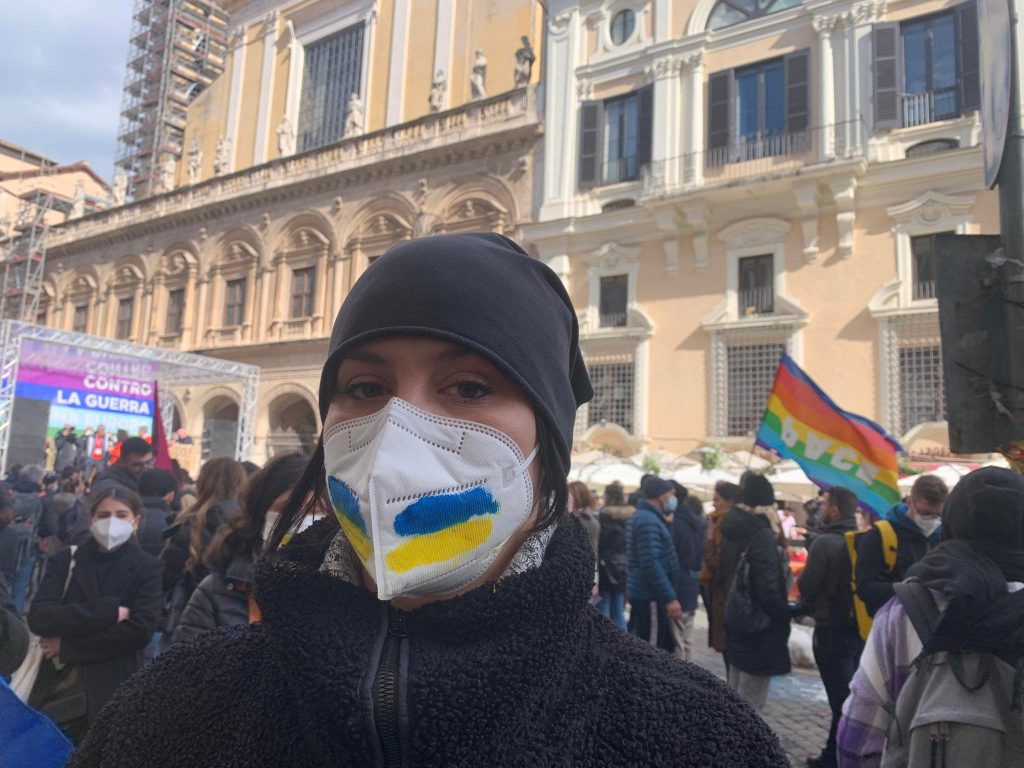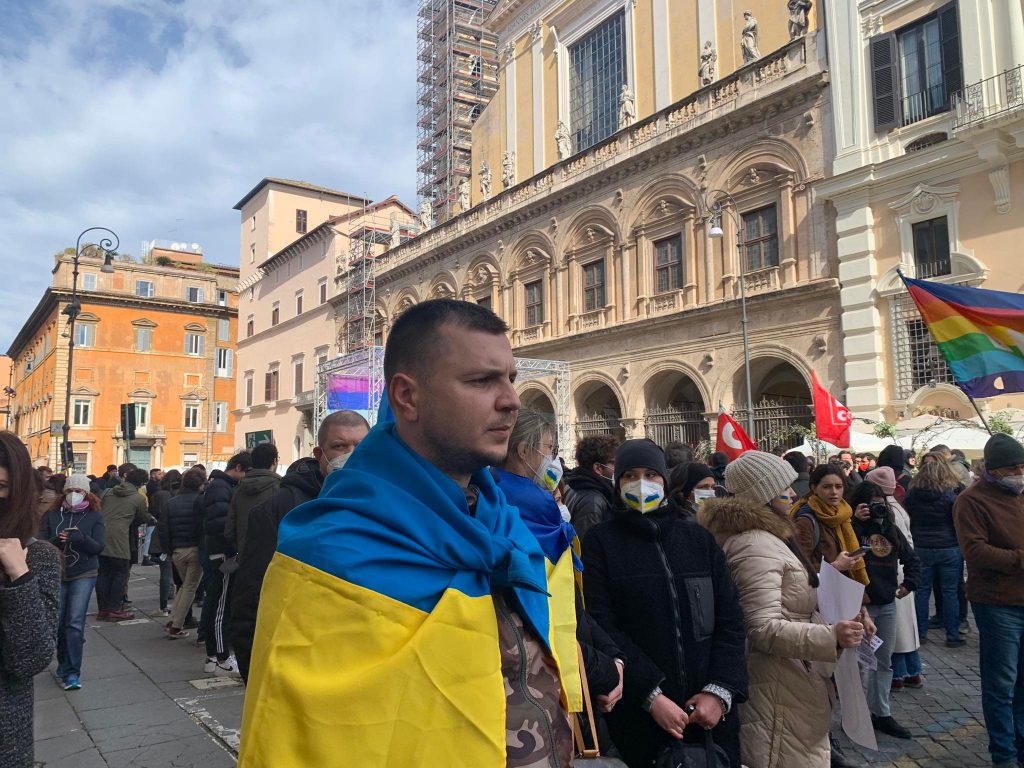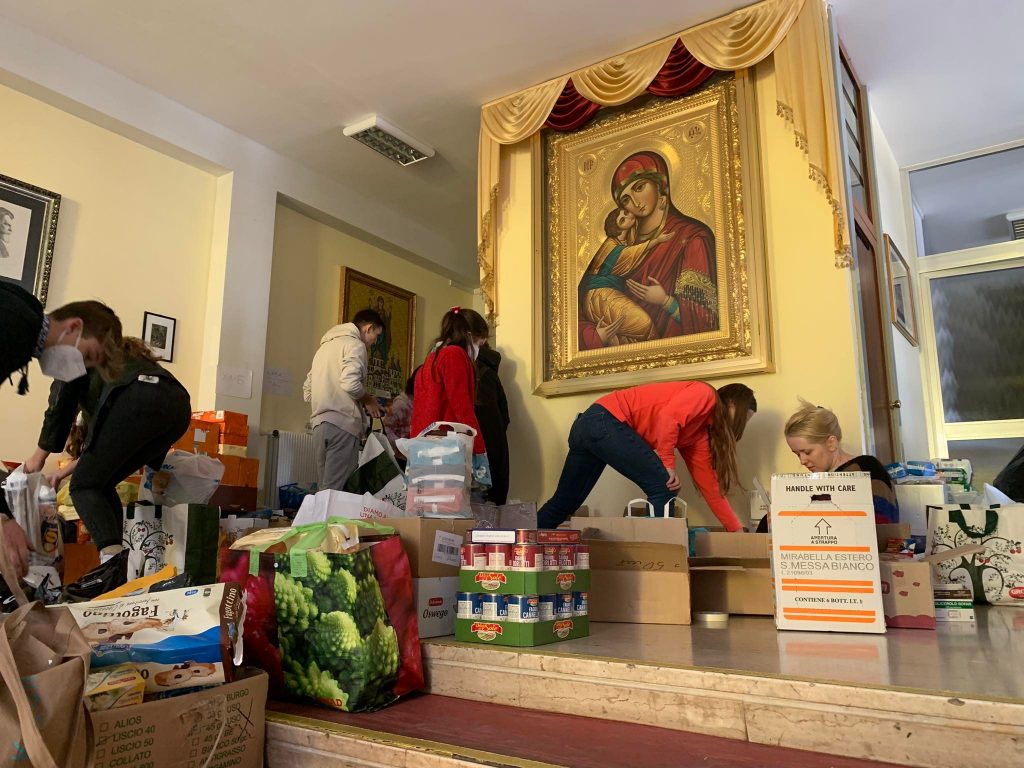https://www.valigiablu.it/comunita-ucraina-italia/
- |
Irina is 35 years old and originally from Kropyvnytsky, a town in central Ukraine.Fifteen years ago, after completing her studies, she arrived in Italy, in Perugia, to join her mother, who had already been in our country since 2000.«My mother came out of need, to work, like many other Ukrainian women did.For twenty years she has been assisting the elderly and disabled, she is a carer, as you say - she states -.He worked in many families, then, when he could, he had us arrive:first my brother then me."
A path completely similar to that of the family of her partner, Oleksy.«My mother also left our city, Starokostjantyniv, twenty years ago, first to work as a family assistant, then as a social-health worker.After a few years, when she stabilized, we arrived with a family reunion.But today our thoughts are more than ever in Ukraine."Irina and Olesky are struggling to sleep these days, their cell phones ring constantly, the horror of war arrives on WhatsApp in a constant flow of images, videos and voice messages.«It's impossible to explain.Some of my friends are at the front, others are under the bombs, they tell us how they try to save themselves - they explain.- And this feeling of not being able to do anything is devastating.The only thing we continue to do is raise our voices, denounce, ask the international community to stop this madness."I meet them in Piazza Santi Apostoli, Saturday 26 February, during the demonstration organized by the Peace and Disarmament Network against Russian military aggression, together with other compatriots who have come from various Italian cities to shout their anger.

With 236 thousand attendances the Ukrainian community in Italy is the largest in Europe. In our country it is in fourth place among the nationalities of the over 5 million foreigners legally residing, after Albania, Morocco and China.A stable presence since the beginning of the 2000s, so much so that now in 77% of cases Ukrainian citizens have a long-term residence permit, while the new entries are mainly of a family nature, i.e. they are reunions.Among the main characteristics is that of being a community with a clearly prevalent female component:women make up around 80% (183 thousand) of Ukrainians in Italy.Most have followed a similar path to that of Irina and Olesky's mothers.

Having left alone to look for work, often following a call from a compatriot already in Italy, they stabilized also thanks to the large amnesties of 2002 And of 2009, which particularly involved domestic workers.Only after regularizing their position and obtaining a residence permit did they bring their children here.«The Ukrainian community has a long history in our country and a strong roots», explains a Blue suitcase Luca Di Sciullo, president of the Idos study and research centre.«Four out of five are women, who have started a real migratory chain:the pioneers found work in the domestic sector and over the years specialized in personal care services.Thus, through word of mouth, they have become highly sought after in the industry.Demand has always remained high, also considering the need for assistance of an elderly population like ours."
Olga arrived in Italy in 2005 from Sumy (Cymn), a city located in the north-east of Ukraine, and since then she has provided care for the elderly in various families in Rome.In her town she worked in construction as a surveyor, but once she was widowed and had two small children to raise, she decided to follow the advice of a friend and come to work here, where the salary as a carer is higher than what she had. at home while continuing to do his job.«I had no choice, I wanted my children to have an adequate education and to be able to go to university - he explains -.Today, however, the enormous sacrifice of separating myself from them to ensure their future is turning into a nightmare.Knowing that my boys are there, in that hell, and I am thousands of kilometers away, torments me."
They call them “white orphans”:they are those children who in Romania, Moldova, Ukraine and other Eastern European countries grow up without their mothers, who have left to take care of families other than their own in other countries.The other side of this phenomenon is what some scholars call “Italy syndrome” and which affects their mothers in our country or once they return to their homeland:a widespread malaise that manifests itself with a set of disabling diseases, including burn out, stress, depression and panic attacks.And which originates from homesickness, concern for loved ones and the continuous suspension of life between two distant worlds.
Since February 24, the day the Russian offensive began, this continuous state of anxiety risks becoming the norm for Ukrainian women living in Italy.Outside the Hagia Sophia in the Boccea district, north of Rome, one of the meeting places of the capital's Ukrainian community, Olga and her other compatriots comfort each other after the Mass on Forgiveness Sunday, which announces Lent for Christians orthodox.There are those who tell of a failed attempt by family members to leave the country, those of the nights spent in the basements used as bunkers, those who confess that they want to return home to be close to their family members.Alina turns towards her friends and with a trembling voice only says:"My son wrote to me, told me he's going to fight, it's a nightmare."

As we speak there is a coming and going of people, arriving in front of the basilica and then heading to an adjacent building with overflowing shopping bags.Inside there are canned foods, long-life drinks, baby diapers, blankets, clothes, medicines.The parish priest, Don Marco Semehen, transformed the back of the basilica into a point for the collection of materials and basic necessities to be sent to Ukraine through the associations.In a flyer distributed to the faithful it is written what to bring.Among the goods requested are also painkillers, gauze, bandages and anticoagulants for combat wounds.«We are now collecting basic necessities to send home, the first parcels left immediately, through various associations.They pass through the western border where distribution centers have been set up and are then sorted.Added to this is a fundraiser we are doing in the church:they will go to Caritas Ukraine to help the many internally displaced people - he says -.Many people offer us their help, there are Italian families who call saying they are willing to host Ukrainian refugees, my cell phone rings continuously."
Read also >> How to help Ukraine and the associations operating in the country
Among the many messages of solidarity, one arrives on Olga's cell phone:It's from Anna, a lady he worked for seven years ago."He how are you?If I remember correctly you are Ukrainian.I just wanted to tell you that we are close to you, we will never be able to do what you did for our family, but if you need it, call me."He is not the only one, he says, who has arrived in recent days:«Many Italian families call us, only the families we have worked for in recent years».
A fundamental piece for Italian family welfare, in recent years Ukrainian women are second only to Romanian women for use in the sector, have made it possible to make up for the many shortcomings of the assistance system for families with minors or non-self-sufficient people.Playing an essential role, not always recognized amidst grueling shifts and inadequate pay.Behind the widespread stereotype of a population essentially of "caregivers", term born with a negative meaning and inferiorising, in fact the imbalances in the labor market are hidden, of which foreign women are the first victims.They are placed in low-level jobs even if they carry out paramedical functions or are highly qualified. According to the data collected by the Ministry of Labour, Ukrainian citizens employed in our country in fact have a high education, much above the average of non-EU citizens.46.6% have at least a second level qualification, 20.8% have also attended university, in a panorama where the majority of workers from non-EU countries (59%) only reach a middle school diploma .In particular, within the community, it is women who have higher levels of education:22.3% of employed women have a degree, compared to 14.8% of men, a value that is decidedly higher than that recorded for the entire non-EU female population (16.3%).
«Even if they have a high school diploma, degree or are highly specialized, in most cases they find a job as family assistants - adds Di Sciullo -.In addition to being under-employed, they are often employed for fewer hours than they would be available to work, on part-time contracts and 'contracts'.In cases of reduced employment, it happens that hours of illegal work are added.And so, by combining multiple occupations, these women end up working day and night.Finally there is the gray area:in many contracts fewer hours are indicated than those actually worked.And this creates problems from a social security point of view, considering that these are workers with an age above the average, in many cases close to retirement."
Second an estimate by Idos and AssindatColf, the national association of domestic workers, those over 50 now represent more than half of the workers employed in the sector, while the presence of housekeepers, carers and babysitters under 30 has drastically decreased.A situation also worsened by the two years of the pandemic, which prevented a turnover in the workforce.«Italy is an aging country that continually needs to employ people in the care sector.But for 12 years the regular entry channels for young workers from abroad have remained closed, even in sectors of activity with growing demand, such as the domestic one - adds the president of Idos -.In the meantime, we continue to use the foreign workforce already present poorly and poorly, which has also fallen by 160,000 units in the year of the pandemic.What is happening in the domestic sector is paradigmatic of a general situation that should question political decision makers."
Making the situation worse is the undeclared economy, with a very widespread irregularity in the sector: the Domina National Observatory estimates around a million domestic workers and carers who work illegally.“In these dramatic days, we have seen the many Ukrainian communities that reside in our cities fill the squares and ask to stop the war, with a strong response of solidarity and closeness from our country”, remember the I Was a Foreigner Campaign.The note highlights that around 20,000 have joined the 2020 regularization with the desire to get out of the black economy as soon as possible and be able to enjoy all the guarantees and rights that are due to workers in our country".
According to monitoring of the campaign, almost two years after the launch of the measure, the examination of applications is proceeding very slowly:“As we have repeatedly underlined, this delay in reality means precariousness because the lack of a residence permit effectively prevents us from being able to access all the protections provided for foreign people residing in our country”.Protections and possibilities which in a moment of crisis like the current one are becoming indispensable for the Ukrainian community.Ero Straniero asks, in particular, to allow family reunification by going beyond "the procedural limits currently set by Italian legislation and with simplification of the related administrative practices, especially with regard to the request for documents and certifications that are difficult to recover in emergency situations".
Preview image: Piazza Santi Apostoli, in Rome, demonstration organized on 26 February 2022 by the Peace and Disarmament Network – Photo by Eleonora Camilli
